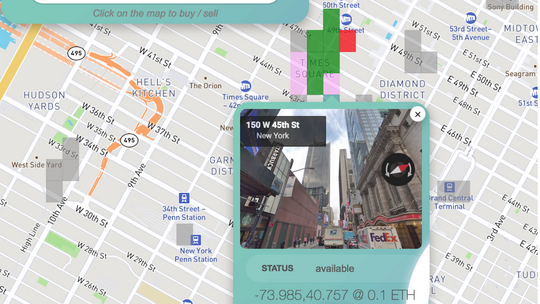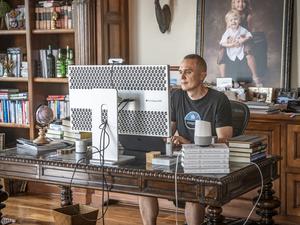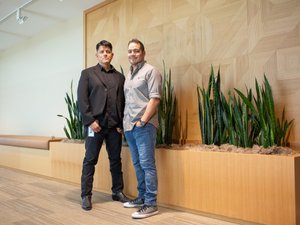
You might not notice it now. But alternate universes are being built on top of our physical world. And you'll find a lot more than Pokemon characters drifting in the digital mist.
With the right device or augmented reality glasses, you'll find everything from historical notes about the location you're in to messages left by friends -- and, of course, advertisements.
The real challenges, it seems, are envisioning how these AR worlds mesh with our physical world, helping consumers get comfortable with the new tech and finding the platforms that will lead the way.
SuperWorld, a Los Angeles- and Austin-based AR startup, is in the race to be a leader in AR landscapes. Its team has developed an app-based AR real estate marketplace that lets you buy and sell virtual space -- such as Times Square -- and profit from ad sales.
Co-founder Hrish Lotlikar describes SuperWorld as Pokemon Go! meets FourSquare meets Monopoly. Inside the AR experience, you could leave your friends messages in pretty much any location – perhaps a tip about your favorite foods and drinks at a restaurant or posting a short video to say hello.
For now, most folks see SuperWorld through their smartphones. But, as AR glasses evolve, SuperWorld’s founders see more people using them on a regular basis.
“Basically, you personalize the world in augmented reality,” he said.
Companies can also create worlds and put interactive AR billboards with discount offers in popular locations. Or, as Lotlikar described, brands could create useful content such as Betty Crocker showing you how to make cookies while you’re in your house. And, by the way, you could click on the video and order ingredients from Amazon with a click or command.
Users can also select which content and brands they see – as well as what content from friends or associates they want visible.
“We want to be very cognizant of our users and our brands and how they come together," Lotlikar said. "I think there’s a big opportunity there where you can really create experiences that amaze people and entertain people and educate people.”
The other aspect of SuperWorld is buying and selling this AR real estate – using blockchain technology and cryptocurrencies. You purchase digital land, say at 6th and Congress, and then you get a portion of any advertisements or content sold in that location. The owner gets non-fundable collectable tokens as title to the digital land, which could be re-priced to whatever you want and resold.
Then it’s essentially a supply and demand market where 6th and Congress may be valuable and lesser known spots are inexpensive. At its start, the available real estate is being sold at 0.1 Ether. Times Square and a few parts of L.A. and other hot spots have already been purchased, he said. SuperWorld is also inviting other apps to build on top of SuperWorld, to help bring in new users.
SuperWorld’s app is available on iOS and Android. The real estate part of SuperWorld is based in a browser.
SuperWorld has been bootstrapped, but it is currently raising a seed round of funding. Aside from its co-founders, the SuperWorld team involves about eight people in engineering, product and marketing. It's looking to expand with key hires.
Lotlikar feels SuperWorld's timing is good because, in addition to AR capabilities of new smart phones, big players like Apple, Facebook and others are said to be working on AR glasses. And customers are increasingly using AR on their phones to virtually try on jewelry or check out furniture.
"Ultimately, glasses is where it's at for AR," he said. "Timing wise, I think we're always very surprised how quickly things can move, especially when all of the major tech players are behind something."
Meanwhile, the company's success will largely hinge on getting enough users to make its real estate and network valuable. So they're focused on finding retentive features, brand partners and influencers to help draw new people and content to the app.
An International Path to Hollywood and AR
Lotlikar has taken an interesting path to his current founding roles at SuperWorld and Rogue Initiative, an L.A.-based entertainment company that works with big film and game productions.
Lotlikar’s career started in management consulting at Aon Hewitt Associates. He then moved to New York for investment banking work on Wall Street at UBS and HSBC Securities before joining Spencer Trask Ventures, where he focused on biotech investments.
Then, Lotlikar got an itch to go abroad and start a venture capital firm in an emerging market – in part because of the 2008 recession that slowed activity in the U.S. He headed to Eastern Europe, first to Ukraine and then Russia, without having any connections in place. He continued traveling the region before picking Kyiv, Ukraine as the best place to launch Eastlabs, which is a VC seed accelerator fund. It focuses on building companies in the country, as opposed to developing products for U.S. or other international companies, as is common.
Lotlikar later helped found an international entrepreneurship school called TechMinsk in Belarus. It’s backed by the U.S. State Department and USAID. He later worked remotely for Palo Alto-based TopTal, which helps companies find top talent around the world.
That led to him starting Rogue Initiative Studios with Call of Duty producer Pete Blumel and filmmaker Michael Bay. They help plan, build and coordinate all the additional offshoots from new films and other media, such as video games based on movies, amusement park rides, fan experiences and the like.
“There’s a lot of things there that are very tech-related, but at the same time it is Hollywood storytelling,” he said, noting that Rogue does most of its development work in-house.
Two years ago, Lotlikar reconnected with entrepreneur Max Woon, who co-founded Xfire, which was acquired by Viacom in 2006, and was more recently CTO at virtual influencer network toonstar in L.A. Together, they founded SuperWorld.
“We got together because we saw Pokemon Go! grow very fast and hit $1 billion very quickly," he said. "We noticed there’s a big, 6.5 billion phones that are AR-enabled very soon. We were like ‘you know what, if we can’t build the next Pokemon Go!, let’s build the platform where the next five Pokemon Gos! get built.”







